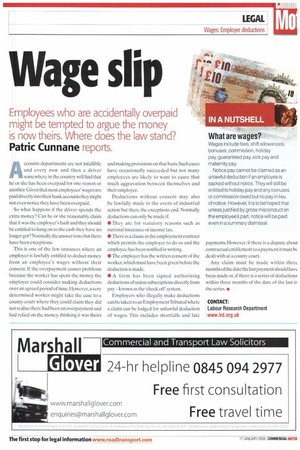Wage slip
Page 27

If you've noticed an error in this article please click here to report it so we can fix it.
Employees who are accidentally overpaid might be tempted to argue the money is now theirs. Where does the law stand?
Patric Cunnane reports.
ccounts departments are not infallible and every now and then a driver somewhere in the country will find that he or she has been overpaid for one reason or another. Given that most employees' wages are paid directly into their bank accounts they might not even notice they have been overpaid.
So what happens if the driver spends the extra money? Can he or she reasonably claim that it was the employer's fault and they should be entitled to hang on to the cash they have no longer got? Normally the answer is no, but there have been exceptions.
This is one of the few instances where an employer is lawfully entitled to deduct money from an employee's wages without their consent. If the overpayment causes problems because the worker has spent the money the employer could consider making deductions over an agreed period of time. However, a very determined worker might take the case to a county court where they could claim they did not realise there had been an overpayment and had relied on the money, thinking it was theirs and making provisions on that basis. Such cases have occasionally succeeded but not many employees are likely to want to cause that much aggravation between themselves and their employer.
Deductions without consent may also be lawfully made in the event of industrial action but there the exceptions end. Normally deductions can only be made if: • They are for statutory reasons such as national insurance or income tax.
• There is a clause in the employment contract which permits the employer to do so and the employee has been notified in writing.
• The employer has the written consent of the worker, which must have been given before the deduction is made.
• A form has been signed authorising deductions of union subscriptions directly from pay — known as the 'check off' system.
Employers who illegally make deductions can be taken to an EmploymentTribunal where a claim can be lodged for unlawful deduction of wages. This includes shortfalls and late payments. However, if there is a dispute about contractual entitlement to a payment it must bc dealt with at a county court.
Any claim must be made within threc months of the date the last payment should have been made or, if there is a series of deductions within three months of the date of the last ir the series.
































































































































































